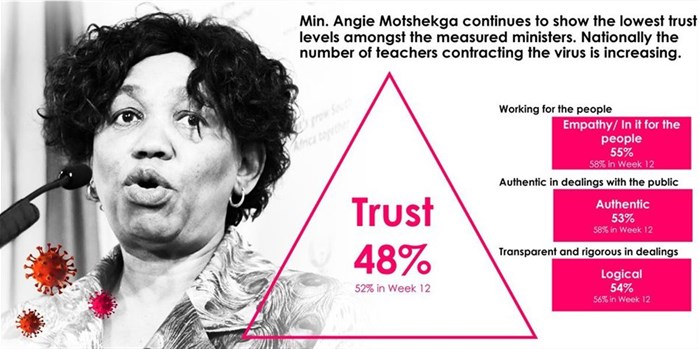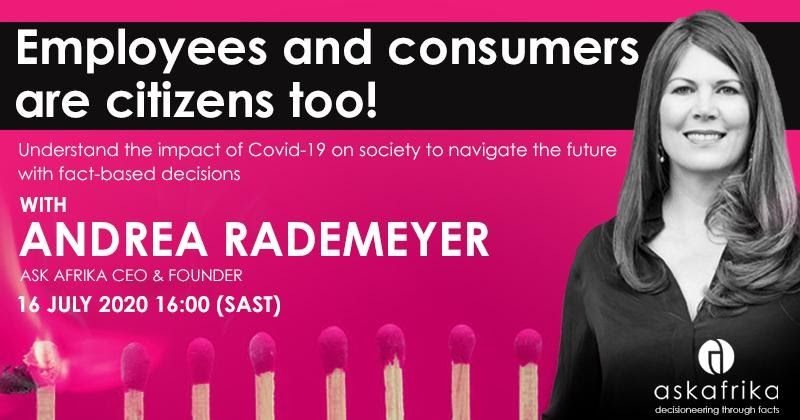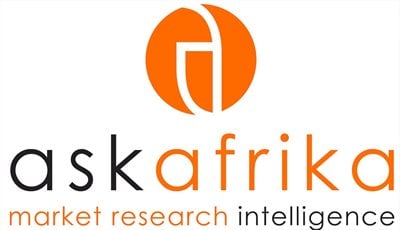In times of distress, South Africans look towards their leaders for direction on how to deal with the impact of Covid-19. Angie Motshekga, the South African minister of basic education, has been in the public eye in the past few weeks, specifically with regards to the re-opening of schools and universities amidst the pandemic. Amongst other themes, the Ask Afrika Covid-19 tracker assesses the trust levels of South Africans in political leaders. In week 13, results show that Minister Motshekga’s trust levels are at 48%, lower than others in the core group of Covid-19 ministers measured. Only 54% of South Africans that participated in the research agreed that she is authentic, transparent and rigorous in her dealings with the impact of Covid-19 on the country’s education system.

Most parents support the gradual phasing in of certain school grades, agreeing that this is the best way to help curb the spread of the virus. Yet concerns about the reopening of schools increased during advanced Level 3.
As more and more parents return to work full-time, more than 60% of respondents say they are concerned about leaving their children at home without proper care. A total of 39% of respondents believe crèche or childcare facilities should open their doors to cater for parents that have to return to work.
Having lost a significant portion of the school year due to the lockdown, 68% of parents and learners believe that the school year should be repeated in 2021. Youth aged 16 to 24 years feel even more strongly about this with 71% arguing that the pandemic cost too much time and that the school year should be repeated.
There is particular concern around the matriculants of 2020 and their ability to successfully complete their grade 12 year given the amount of lost teaching days. Most respondents agree that the academic year should be repeated. A total of 63% of respondents believe the current academic year should be cancelled, while an overwhelming 72% believe that the start of the 2021 academic year will be delayed.
Township residents are less confident than suburban residents about schools reopening. According to the study, 46% of township residents are concerned about schools going back compared to only 39% of suburban residents. The concerns of township residents are perhaps rooted in the fact that only half of township residents have access to online learning tools. According to the study, 51% of township learners don’t have access to a laptop or tablet, printer or the necessary stationery for online studies.
The study found that 42% of people are concerned that there will not be sufficient masks and sanitation equipment to keep everybody safe and healthy when schools and tertiary institutions reopen. The youth are more concerned about this issue than older generations with 45% saying they are not confident that there will be enough masks and sanitation equipment compared to only 36% of the older generation sharing this view.
The fear of physically returning to institutions of higher learning is even higher with 77% of respondents arguing that there are enormous risks if students return to their institutions abruptly. The majority of respondents believe online counselling sessions should be arranged for students in a distressing situation due to the current disruption.
They also believe that institutions of higher learning must evaluate the advantages and disadvantages of online teaching based on their specific context. Around a third of respondents are not in favour of online teaching at universities. More than 70% of respondents maintain that students living in rural areas and from low income families will be disadvantaged through online teaching and learning.
However, this is juxtaposed with the fact that 57% of respondents believe online teaching can be as effective as traditional classroom teaching, 61% believe examinations through online resources are achievable for most South African universities and 56% believe most institutions of higher learning are well prepared for online teaching.
As far as tertiary education institutions are concerned, most respondents – 73% – agree that the disruption caused by the pandemic will have a ripple effect on higher education. A total of 74% of respondents believe universities should invest more in distance learning while 72% say universities should prepare resilience strategies for the post-coronavirus era. Encouragingly, 68% of respondents believe institutions of higher learning can make up for the loss of time to their teaching year if they plan strategically.
Find out more:
Register for our FREE Webinar event on 16 July, 4pm (SAST) as we share our latest research in understanding the socio-economic impact of the coronavirus, lockdown and gradual re-opening of the economy on South Africans: https://www.crowdcast.io/e/covid19_sociallisteningevent/register
About Ask Afrika’s Covid-19 tracker
Ask Afrika’s quantitative research is conducted via computer aided telephone and online interviews. Each week the study explores different themes and topics in order to better understand relevant issues and provide an immediate statistic.
Private and public sector entities are able to participate in the research to establish how the pandemic is impacting South African citizens.
For more information contact: Mariëtte Croukamp on az.oc.akirfaksa@pmakuorc.etteiram or visit www.askafrika.co.za
About Ask Afrika
Ask Afrika is a decisioneering company. We support our clients’ decisions through facts. Our clients’ decision requirements are around social research and philanthropy, experience measures and consulting and brand dynamics.
Social research decisions are required around HIV/Aids and most recently Covid-19. Educational and early childhood development, fair-trade shopping, media and financial research are some of the areas we love to work in. NGOs, public and private sector clients work with us to get the pulse of nations.
Besides being decisioneers in brand and customer experience research, Ask Afrika is well known for creating some of the most useful, go-to industry benchmarks, including the Ask Afrika Orange Index®, the Ask Afrika Icon Brands®, the Ask Afrika Kasi Star Brands and the Target Group Index (TGI). Ask Afrika’s knowledge of brands is extensive and the Target Group Index (TGI) survey, which measures psychographics, service, products, media and brands, has been used by the majority of the top 50 advertisers and media owners in South Africa for nearly two decades.
Our clients operate across various industries; including retail, telecoms, finance, and the public sector. We offer tailor-made and ready-to-use offerings for all our clients regardless of the size of project.
We are brave, agile, vibrant and experimental. We apply deep thinking and are great in everything we do, to make an impact that matters.
With us, you can make game-changing business decisions confidently.
www.askafrika.co.za | az.oc.akirfaksa@tcennoc | az.oc.akirfaksa@ofni















































